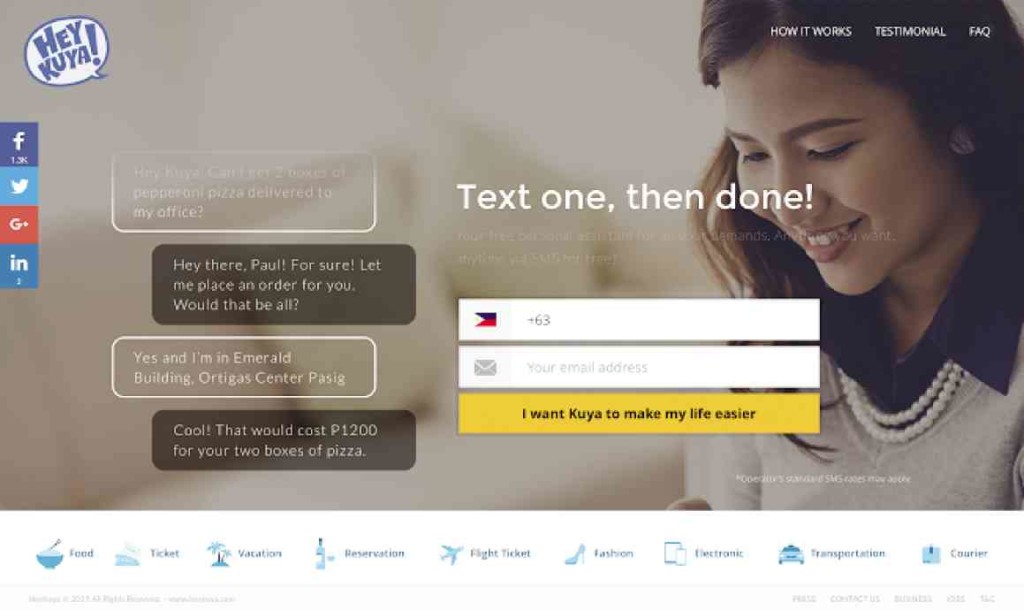Personal assistant startup finds boss, makes money
Although the tech ecosystem in the Philippines is still young, many entrepreneurs are already dreaming about their startups getting bought out by a larger player. For Shahab Shabibi, the founder of HeyKuya, this goal was achieved this March, when Indonesian analogue YesBoss bought his company for an undisclosed amount of cash and shares.
HeyKuya, like its purchaser YesBoss, is an SMS-based service. Writing in everyday language, users can text in and request assistance from booking flights and ordering food to coordinating delivery with a courier and reserving a table at a restaurant.
For its back-end, there is a team of virtual assistants who work to meet the particulars of each request in the most efficient time possible. The service is supposed to feel like a personal butler, available only a text away.
Raising money
Shabibi did not initially plan to sell HeyKuya, which was formally set up under parent firm Machine Ventures. But Shabibi began to look at the possibility of raising money from venture capitalists five months thereafter.
Article continues after this advertisement“While entertaining that option, we thought, where would we be spending this money?” Shabibi asked. “Technology, scaling and building an even greater team?”
Article continues after this advertisementItemizing where they would spend the venture capital made Shabibi and his team realize they would be competing for the same resources in the region, which would make the market all the more saturated. “It’s not good for the other players in the region and definitely not great for us,” he said.
As a result, they began to think of joining forces with existing players in the space so they could not only share resources but also best practices. “We looked around and we saw that YesBoss is a company that shared the same values as ours (I guess the name similarity should speak for that) and that would enable us to reach unprecedented growth,” Shabibi said.
After exchanging a few e-mails and only two meetings, the two companies already came up with a gentlemen’s agreement on how the buy-out would be structured. Shabibi said the speed with which they reached a deal attests to how fast the companies move and want to grow.
“In a space that was getting crowded with small players, we wanted to be the pioneers to consolidate and dream bigger,” he said.
For its part, YesBoss gets to enter a new market in the Philippines with a team that is operational and already moving with amazing traction. HeyKuya initially had 5,000 users. By the time the deal was officially announced on March 15, the HeyKuya team was already celebrating its 15,000th user.
According to Shabibi, the biggest challenge was maintaining this growth.
“Keeping focus on growing the company when the legal process and due diligence were taking place seemed like a challenge before we got into it, but we thought if the acquirer wanted to slow us down just for that, then we have probably chosen the wrong party to enter talks with,” he said.
Advice
While many founders would have chosen to leave a company after its acquisition, Shabibi chose to remain at the helm of HeyKuya. The reason he did is relevant to why he founded HeyKuya in the first place—to save people’s time from being wasted on menial tasks while showing how customer service should be.
Some people have criticized the economic progress of the Philippines over the last decade for being not inclusive. Shabibi wants HeyKuya to be accessible to all.
“We wanted an inclusive innovation. We wanted it for everyone. In many cases, getting acquired could have been a consequence of such beliefs, but in our case, it became a catalyst to reach that point even faster, better and bolder. That is all we care about,” he said.
As the most recent public acquisition of a startup in the Philippines, other founders in the country will naturally look to Shabibi for advice on how to achieve the same.
He said getting acquired is just a validation and consequence of doing the right thing—building a business with real value and the opportunity to impact millions of lives would always make one a target for acquisition.
“So instead of asking the question on how to build a company that sells, ask yourself how you could build a venture that does the right thing, has a higher goal and holds a truly priceless value,” he said.
Shabibi suggested the problem of traffic in the Philippines was an area where an entrepreneur can make an impact. As a very complex macro problem, entrepreneurs can break it into smaller addressable parts, he said.
“If you are able to save people’s time and help them avoid jumping into this flood of traffic, then that is still an indirect solution solving a big problem,” he said.

